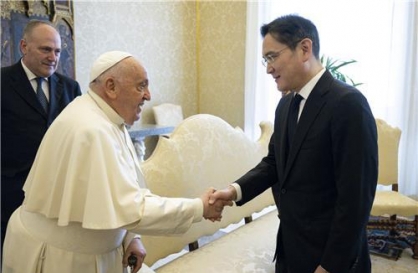Ministry makes last-ditch appeal for streamlined command structure, jointness
A parliamentary defense committee is poised to vote on Friday on five bills aimed at improving the military’s command structure and cooperation among its three armed branches after nearly a year of political bickering.
Committee chairman Rep. Won Yoo-chul of the ruling Saenuri Party has notified its members from the main opposition Democratic United Party of the plan to vote on the bills when the committee convenes its last plenary session on the day.
“I am trying to appeal to the committee members to do our best right up to the end and push aside any political considerations when it comes to these bills concerning national security,” Won told The Korea Herald.
“Before the April 11 general elections, the bills were burdensome for some. Now that they are over, I am appealing to them to think only about what is in the best interests of our nation, strictly from the standpoint of national security.”
Submitted to the legislature last May, the bills seek to unify the top commanding structure divided into operational and administrative parts to make it “strong, speedy and slim.” They are also designed to fully prepare for the retaking of wartime operational control from Washington in December 2015.
They were crafted after operational shortcomings were revealed following North Korea’s torpedoing of the corvette Cheonan in March 2010 and its shelling of the South Korean border island of Yeonpyeong in November that year.
The two attacks killed 50 South Koreans including two civilians.
The Defense Ministry has been making last-ditch efforts for the bills’ passage as they are to be scrapped automatically if the 18th Assembly closes on May 29 without approving them.
“Military threats from the North have recently increased with the latest one threatening the security of the capital of Seoul. Under the current commanding structure, we cannot make a rapid, well-coordinated, effective response (to future provocations),” Hong Kyu-dok, chief of the ministry’s military reform division, told The Korea Herald.
“Should we fail to pass them this time, we would have to reorganize them and seek their passage in the next legislature. Should it pass only through the defense committee this week, it would still be good as it itself could have a symbolic meaning.”
Despite such efforts, however, uncertainty still lingers over the bills’ parliamentary passage.
Observers said that it would be difficult to form a quorum for the committee’s voting. Only six of the 17 committee members were elected for the next legislature. Those who lost in the elections or did not run may not be interested in the bills, they said.
Even if the bills gain committee-level approval, there remains a tougher legislative hurdle to clear before the final full-house vote. They must undergo the final deliberations at the judicial committee, which is chaired by a member of the DUP which is largely against the defense overhaul proposals.
Others say that even if the military reform bill issue is left over to the next Assembly, deliberations on the matter would be likely to be delayed as the rival parties may be busy focusing on the presidential election to come in December.
The centerpiece of the envisioned reform is the reorganization of the top command structure with focus on strengthening the role of the Joint Chiefs of Staff chairman, who will serve as the commander for wartime theater operations on the peninsula.
Under the plan, the ministry seeks to put four-star chiefs of the Army, Navy and Air Force under the operational control of the JCS chairman so that they can command military operations with their own experience and expertise.
Currently, they only have the authority to lead personnel management, education, logistical support and other administrative affairs. They have no authority to direct field operations. Instead of them, separate three-star commanders in each armed branch take charge of military operations.
Critics including retired generals argue that with what they call the “inordinate” authority, the JCS chief, who has come from the Army so far except for one occasion, could hold sway over all the other military branches and hamper cooperation among them.
By Song Sang-ho (sshluck@heraldcorp.com)
A parliamentary defense committee is poised to vote on Friday on five bills aimed at improving the military’s command structure and cooperation among its three armed branches after nearly a year of political bickering.
Committee chairman Rep. Won Yoo-chul of the ruling Saenuri Party has notified its members from the main opposition Democratic United Party of the plan to vote on the bills when the committee convenes its last plenary session on the day.
“I am trying to appeal to the committee members to do our best right up to the end and push aside any political considerations when it comes to these bills concerning national security,” Won told The Korea Herald.
“Before the April 11 general elections, the bills were burdensome for some. Now that they are over, I am appealing to them to think only about what is in the best interests of our nation, strictly from the standpoint of national security.”
Submitted to the legislature last May, the bills seek to unify the top commanding structure divided into operational and administrative parts to make it “strong, speedy and slim.” They are also designed to fully prepare for the retaking of wartime operational control from Washington in December 2015.
They were crafted after operational shortcomings were revealed following North Korea’s torpedoing of the corvette Cheonan in March 2010 and its shelling of the South Korean border island of Yeonpyeong in November that year.
The two attacks killed 50 South Koreans including two civilians.
The Defense Ministry has been making last-ditch efforts for the bills’ passage as they are to be scrapped automatically if the 18th Assembly closes on May 29 without approving them.
“Military threats from the North have recently increased with the latest one threatening the security of the capital of Seoul. Under the current commanding structure, we cannot make a rapid, well-coordinated, effective response (to future provocations),” Hong Kyu-dok, chief of the ministry’s military reform division, told The Korea Herald.
“Should we fail to pass them this time, we would have to reorganize them and seek their passage in the next legislature. Should it pass only through the defense committee this week, it would still be good as it itself could have a symbolic meaning.”
Despite such efforts, however, uncertainty still lingers over the bills’ parliamentary passage.
Observers said that it would be difficult to form a quorum for the committee’s voting. Only six of the 17 committee members were elected for the next legislature. Those who lost in the elections or did not run may not be interested in the bills, they said.
Even if the bills gain committee-level approval, there remains a tougher legislative hurdle to clear before the final full-house vote. They must undergo the final deliberations at the judicial committee, which is chaired by a member of the DUP which is largely against the defense overhaul proposals.
Others say that even if the military reform bill issue is left over to the next Assembly, deliberations on the matter would be likely to be delayed as the rival parties may be busy focusing on the presidential election to come in December.
The centerpiece of the envisioned reform is the reorganization of the top command structure with focus on strengthening the role of the Joint Chiefs of Staff chairman, who will serve as the commander for wartime theater operations on the peninsula.
Under the plan, the ministry seeks to put four-star chiefs of the Army, Navy and Air Force under the operational control of the JCS chairman so that they can command military operations with their own experience and expertise.
Currently, they only have the authority to lead personnel management, education, logistical support and other administrative affairs. They have no authority to direct field operations. Instead of them, separate three-star commanders in each armed branch take charge of military operations.
Critics including retired generals argue that with what they call the “inordinate” authority, the JCS chief, who has come from the Army so far except for one occasion, could hold sway over all the other military branches and hamper cooperation among them.
By Song Sang-ho (sshluck@heraldcorp.com)
-
Articles by Korea Herald






![[Weekender] Korean psyche untangled: Musok](http://res.heraldm.com/phpwas/restmb_idxmake.php?idx=644&simg=/content/image/2024/05/02/20240502050841_0.jpg&u=)



![[Herald Interview] ‘Time to Be Strong’ follows retired K-pop idols’ self-discovery](http://res.heraldm.com/phpwas/restmb_idxmake.php?idx=644&simg=/content/image/2024/05/03/20240503050550_0.jpg&u=)







![[Herald Interview] Director of 'Goodbye Earth' aimed to ask how we would face apocalypse](http://res.heraldm.com/phpwas/restmb_idxmake.php?idx=652&simg=/content/image/2024/05/03/20240503050732_0.jpg&u=)
